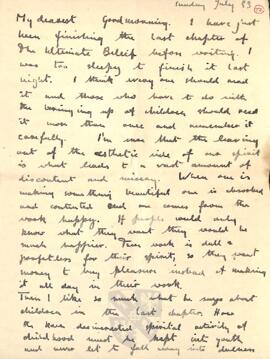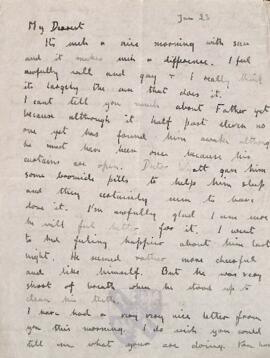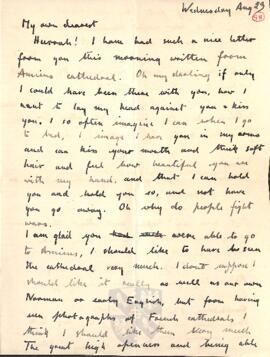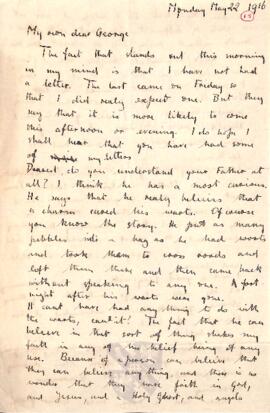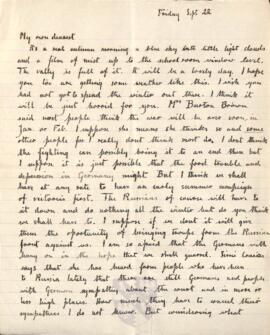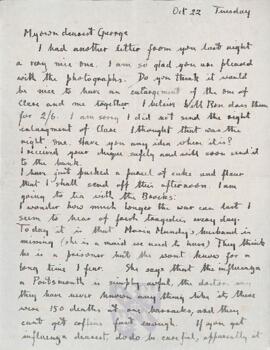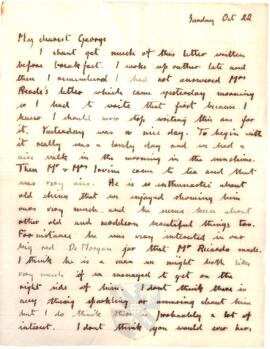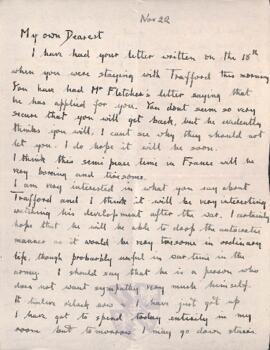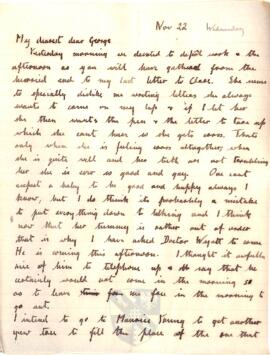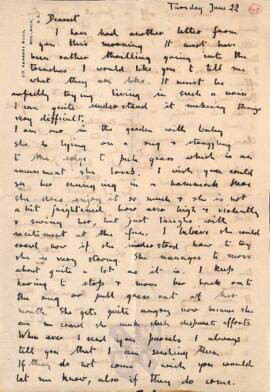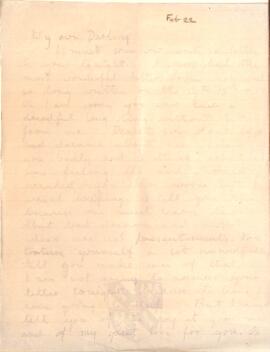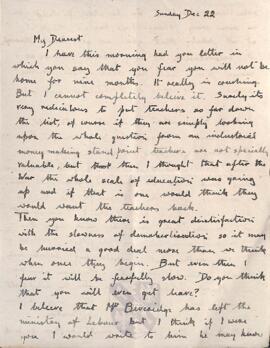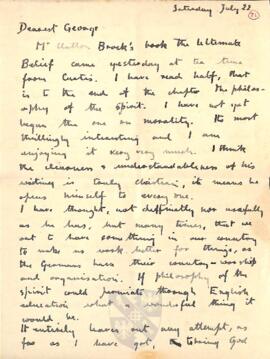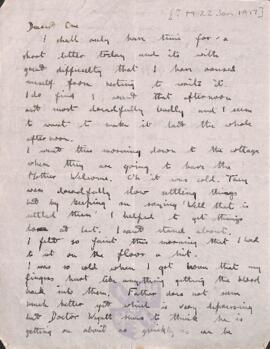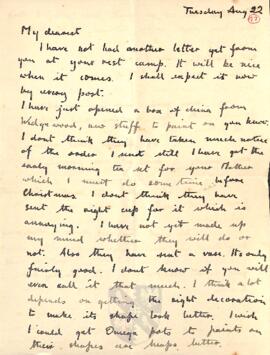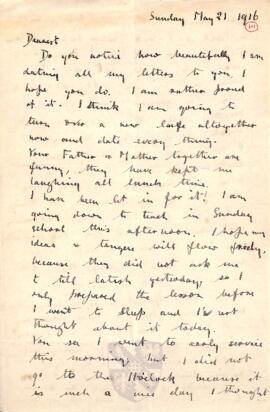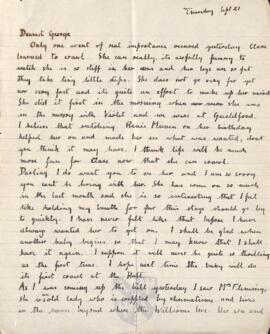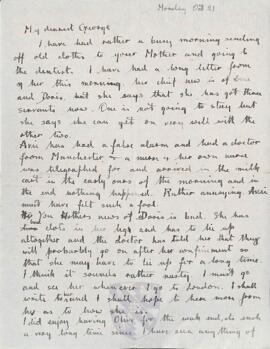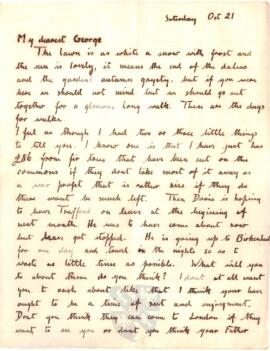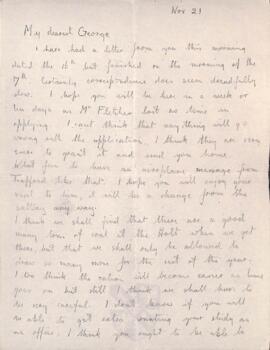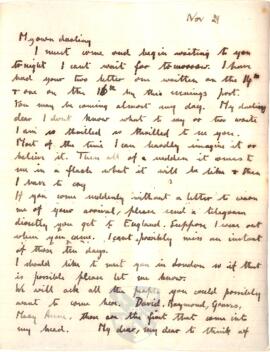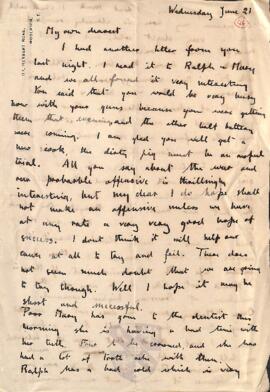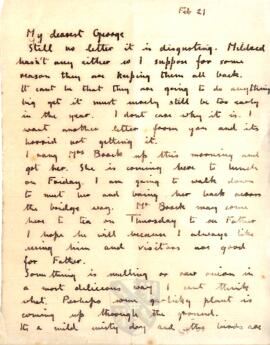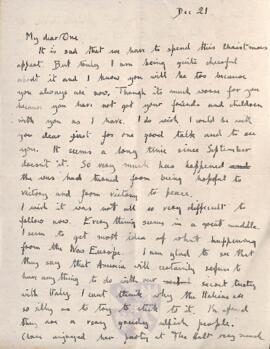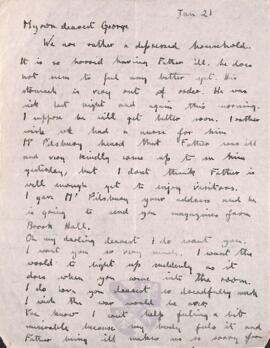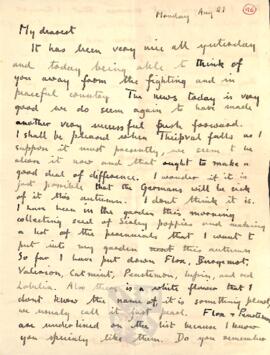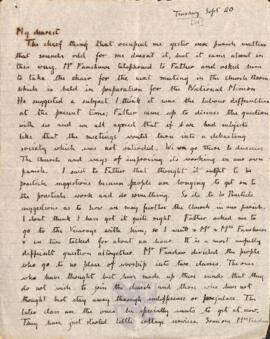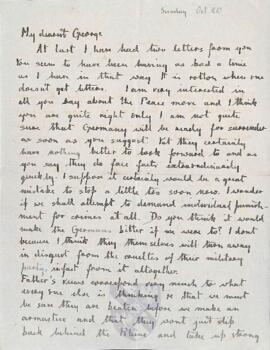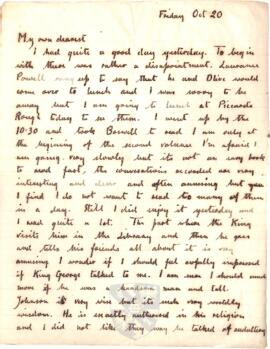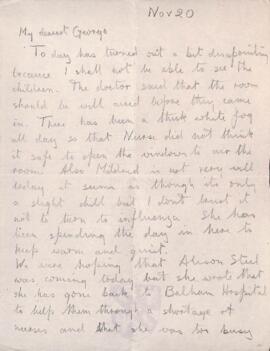Discusses her opinions on The Ultimate Belief by Arthur Clutton-Brock. Expresses her thoughts on the difference in education for boys and girls. Describes her previous tea with Mr Cockerell and describes his wife’s condition. Wonders what he wanted to tell her and couldn’t and discusses the progress of the war. Tells him about her dream. Is glad he received the butter and will send more. Informs him Marjorie has gone to fetch the Clutton-Brocks and their children for a visit. Relays a message of greeting to him from Mr Cockerell and Marjorie Waterhouse.
Updates him on her father's health. Expresses her wish for him to be made a Second Lieutenant. Describes Violet's thoughts about the new baby. Tells him about a visit by Rachel Dixon.
Is glad to have received his letter and is happy to hear of his trip to Amiens cathedral. Expresses her wish to be with him. Describes her opinions of French cathedrals and her ideas of civilization. Hopes that his rest will be a long one and is glad his duties as orderly officer are not taxing. Updates him on Clare's progress. Encourages him not to write everyday of his rest days. Tells him how Mildred expects Bob home on leave. Describes her thoughts on his description of the cathedral. Expresses her relief to have Violet back helping with Clare. Tells him about her father's lack of humour concerning his enthusiasm for golf. Informs him that Mildred and Aunt Eleanor are at the depot and expresses her opinion about Aunt Eleanor's character.
Recounts to him his father’s story of how he cured his warts with a charm. Discusses her opinions on the search for truth. Intends to take a drive with his mother and her friends. She updates him on Clare’s progress. Asks him if he has horses with him and asks for more information so she can find the location on Ralph’s map. Speculates on his location. Describes how she has sent him letters to different locations. She hopes that he will stay in his current location. She intends to go back to Westbrook on 1 June.
Describes the weather. Discusses the progress of the war. Describes her journey to find a box maker. Tells him about her thoughts on the Mission service she is to take. Describes Clare's play activities.
Asks him if he would like enlarged photographs of herself and Clare and tells him about the parcel she is packing for him. Informs him that a former maid of theirs has heard that her husband is a prisoner of war and brings her news of the Spanish Flu in Portsmouth that has taken 150 lives so far. Discusses her father's and Mr Pilcher's ideas of Mr Clutton-Brock's book. Discusses the progress of the war. Tells him she intends to stay in London to visit two Montessori schools and her plans for visiting Doris and the British Library.
Describes her tea with Mr and Mrs Irvine and her visit to Prior Field. Describes the two plays they watched. Updates him on Clare’s progress. Discusses his previous letter and asks him questions about his trip to Amiens. Discusses the progress of the war. Asks him about the poem he was writing.
Acknowledges his last letter and discusses Trafford's character and how he might get on after the war. Apologises for him not receiving any parcels while she was ill with influenza and tells him the contents of his next parcel. Expresses her anxieties over starting the Montessori class and the slowness of the postal service. Discusses how to give the appropriate amount of time to the children and their plans for moving back to the Holt.
Updates him on Clare's progress. Asks him about his new curtain and whether he likes the items she sent to him. Tells him she wishes to find Renan's Life of Jesus to read. Discusses the progress of the war. Describes the weather and her morning activities with Clare and Violet. Expresses her happiness at his intended arrival. Informs him of a new master at Charterhouse.
Asks him what he thought of the trenches. Describes how she plays with Clare. Tells him she has sent his food items and asks him to let her know when he receives her parcels. Informs him that Clare had been sick due to eating grass. Updates him on Clare's progress. Expresses her wish for him to write her poetry. Asks to know more about Glen and Savage. Asks how many back copies of The Times he would like.
Reassures him she is starting to feel better and not to worry about her. Tells him she is happy he was thanked by the General and the Colonel. Asks him about the job he is going to do. Thanks him for the photograph of where he is staying and tells him she likes his note book extracts. Tells him about Ursula's sister being ill and intended visits from Mrs Burton Brown and Bice. Updates him on her father's health.
Expresses her disappointment that he may not be home for another nine months. Recommends that he write to Mr Beveridge and Mr Fletcher about his leave. Discusses arrangements for the Holt in his continued absence. Asks him for his opinion about the Government's organisation of demobilisation. Expresses her gratitude for him surviving the war and her disappointment that it is taking so long for him to come home. Asks him what the French organisation for demobilisation is like. Discusses her opinions on Neitsche and Christianity and the merits of living alone.
Is reading The Ultimate Belief by Arthur Clutton-Brock and discusses her thoughts on his writing style, morality and philosophy of spirit. Discuss her opinions on religion in education. She was mistaken in telling him that Mr Thompson had been killed; it was someone else. Updates him on the progress of Mrs Irvine’s premature baby. Describes the weather. Informs him that Clare has not slept well. Intends to have Mr Cockerell and Marjorie Waterhouse to tea. She intends to do more china painting. Discusses the progress of the war.
Describes her visit to the Mother Welcome meeting. Updates him on her father's health. Discusses the book she is reading Geoffrey Hamlyn by Charles Kingsley. Expresses her concern for his welfare. Tells him about Marjorie's job and how she is coming home. Updates him on how she is feeling.
Tells him she has not yet received his letters. Discusses the Wedgwood order she has had delivered and the tea set she plans for his mother. Describes her conversation with Mrs Radcliffe on the relationship between mothers and daughters. Describes her tea with Mrs Huxley and continues with her thoughts on raising daughters. Describes a story told to her by Mrs Huxley. Informs him Violet intends to stay with her father longer. Expresses her wish to live with him again. Tells him her plans for the garden at The Holt. Informs him that Aunt Eleanor has arrived.
She is having a nice time with his parents. Tells him that she is teaching a Sunday school class. Describes a walk to Bidstone Hill with Clare and Violet. Hops that he will receive her letters soon. Tells him of his father being called away to a dying man. Informs him that her Sunday school lesson went well. Expresses her feelings over her recent depression. Discusses her opinions on the life of a clergyman.
Updates him on Clare’s progress. Describes meeting Mrs flemming and her son and daughter-in-law and tells him the son working in the tank department at the war office. Discusses the progress of the war in relation to the new tanks. Describes her morning activities and discusses her thoughts on being well dressed. Informs him that Mrs Burton Brown and Bice are paying a visit. Tells him she loves him.
Updates him on news from his mother's letter about the health of Avie and Doris. Tells him she had a nice weekend with Olive. Discusses in detail her opinions of the book Natural Law in the Spiritual World. Expresses her concern for her religious life and discusses the ways she can improve it. Updates him on Clare and Berry's progress. Discusses Clare's character and her relationship with Berry. Discusses the progress of the war.
Describes the weather and the garden. Tells him they have received £86 from the sale of fir trees and how Trafford is coming home on leave. Discusses his possible itinerary for his leave. Describes how Will Kennedy received his Military Cross and how the Piccards Rough Hospital is doing well. Expresses her thought about pessimistic people. Discusses the speed of the post. Describes her morning activities. Is glad he has received his parcels from her. Discusses Bob and Mildred living in Eashing and the advantages of an observation post. Informs him she intends to stay at Mrs Reade’s the following week.
Acknowledges his letter and expresses her hopes that he will be home soon. Discusses the coal situation at the Holt. Describes her surroundings. Discusses in detail her opinions about the German and Russian Revolutions. Describes playing with the children. Expresses her happiness that Mr Fletcher has applied for his leave. Tells him that Mildred will not be allowed to go to France to live with Bob.
Acknowledges his letter mentioning he might be home on leave soon. Discusses in detail how she would like to meet him in London and what friends to invite over. Expresses her happiness in the possibility of having him home. Asks him about his new accommodation and about Captain Lithgow and Mr Chignall. Discusses the the comforts of home and compares his conditions in the war with those of the poor.
She has read his letter to Ralph and Mary. Discusses his duties and living conditions as described in his last letter. Expresses her opinions about the progress of the war. Describes her walk with Clare and Mary. Discusses her thoughts on the fear of Hell and the merits of good behaviour. Intends to stay to see Henrietta Livingstone. Informs him his pamphlet has been read by Mr Clutton-Brock, Mr Arthur Benson, and Mr Fletcher and gives their opinions of it. Tells him she is proud of him. Describes the maps of Armentières and the trenches she was shown by Ralph. She hopes he does not have to see dead bodies.
Expresses her annoyance at the postal service. Tells him about the Brocks coming for tea. Describes her surroundings and wonders what his are like. Updates him on Clare's walking progress and her father's health. Describes a letter from Aunt Patty regarding Doris' new job at the war office and discusses Doris' health. Informs him she has written to his mother. Asks him about the food in France.
Reflects on the last few months and expresses her sadness that he is not home for Christmas. Discusses the progress of demobilisation. Describes a conversation with Mary Anne and Violet about the Holt and the moving date. Expresses her concerns about Clare learning bad manners from the Fletcher boys. Tells him what presents she sent to his family and the preparations for Christmas. Reflects on all the things they can do together when he is home. Discusses the sugar ration.
Updates him on her father's health. Expresses her feelings of unhappiness about the war and everyone's state of mind. Tells him she has told the servants about the pregnancy and informs him that Violet is not pleased. Expresses her feelings about the baby being a boy. Tells him that his letters bring her joy and that she is looking forward to having another baby.
Discusses the progress of the war. Describes her plans for the garden. Intends to have the Huxley's over for tea. Wonders if the Germans are feeling the same way as them. Asks him if he is allowed to send more information on his location and activities. Informs him that Clare's photographs are ready. Describes Clare's character. Asks him if he wants U.D.C papers sent to him and discusses their content.
Informs him about being included in her father and Mr Fanshawe’s meeting for the National Mission. Discusses in detail the question of how the Church can help with practical matters within the parish. Describes in detail the service she attended through the Mission led by Mrs Fanshawe. Informs him that she will be leading one of her own. Discusses the progress of the war. Discusses the book she is reading and future reading material. Asks him to try and let her know if he moves. Hopes that his men can get rid of their lice.
Expresses her happiness at receiving letters from him. Discusses in detail the progress of the war and peace talks. Expresses her gratitude that he has not been affected by shell shock. Expresses her opinion about fighting from the air. Describes a conversation between herself, her father and Olive about the leisure provisions for working men after the war and how to close the class divides. Tells him how she would like to meet the man Olive is engaged to.
Morning - Describes her previous day’s activities. Discusses Boswell’s book, particularly his thoughts on adultery. Describes her trip into London by electric train and talking to Doris about her expected baby. Describes her journey home on the bus.
Evening – Expresses her love for him and her wish to have another baby. Tell him that Doris believes Trafford to be on the Somme.
Tells him that Mildred is starting to feel unwell and Alison Steel will not be coming to visit. Discusses demobilisation and when he is likely to come home. Updates him on her father's health. Expresses her opinions on Mr Clutton Brocks' Studies in Christianity. Describes her activities for the day. Expresses her love for him.
